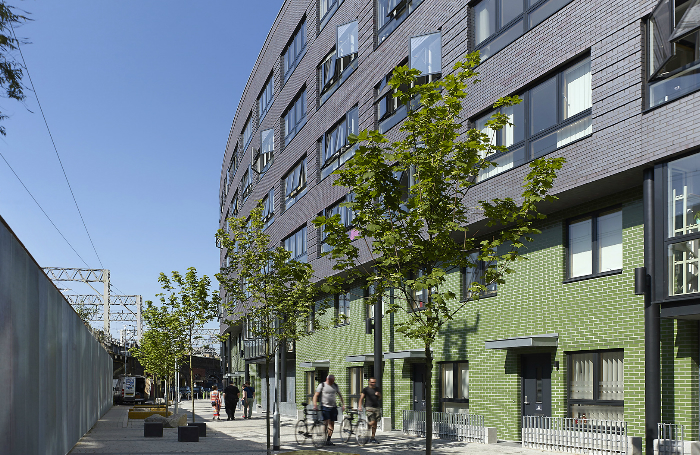London Mayor Sadiq Khan will update and consolidate London’s housing design standards into a single planning document next year, with a design-led approach to higher-density typologies suited to different parts of the capital.
In his draft London Housing Strategy published earlier this month, the Mayor gives his backing to a future housing Expo in London that will showcase good design across a range of high-density housing types seen as necessary to ensure an increase in housing delivery.
These will not be high-rise towers, but rather mid-rise residential units for outlying areas, intensification around town centres and transport links, and housing built using precision manufacturing.
Deputy Mayor for housing James Murray has already been briefing on City Hall’s desire to see more homes built on small sites and to introduce high-density housing formats – but not high-rise – to outer London boroughs not accustomed to high-density development.

The draft document commits to maintaining existing space standards for new homes along with strict accessibility standards, as well as a commitment to a zero carbon target for new housing developments.
When it is published next year the new London Plan will give a ‘clear presumption’ in favour of appropriate residential development on small sites, including outlying ‘areas that have traditionally contributed less to London’s supply of new homes’.
Further support for the development of small sites will be given by setting borough-level development targets and by introducing pay-by-instalment options for the mayoral community infrastructure levy on medium and small development sites as support for small builders.
Developers with estate renewal plans are put on notice that the new London Plan will require the replacement of demolished homes on a like-for-like basis. Formerly just a voluntary recommendation, this policy will become a key planning requirement.
The headline announcement at the launch of the draft strategy was a new £250m fund for buying and preparing land for new and affordable housing. Murray has declared that the aim of the fund is to purchase land that would not normally become available for development. Receipts from selling the land to home builders will be recycled to buy further land.
The mayor’s target is to build 90,000 new affordable homes in the capital by 2021. He has a record £3.15 billion affordable housing budget at his disposal, but used the draft strategy launch to call for a comprehensive and urgent devolution of funding and powers that recognises the housing challenge facing London.
RIBA Housing Group members have welcomed the ambition and scope of the mayor’s draft strategy.
‘It’s comprehensive and is an attempt to tackle the housing crisis on many fronts, though certain aspects look to be beyond the mayor’s powers and resources and will require him to work with central government,’ comments Pitman Tozer director Luke Tozer.
‘Recognising that there are more opportunities in outer boroughs is spot on, while the mayor’s support for Living Rent alongside Affordable Rent and shared ownership is facing up to the fact that 80% of homes for market rent in London are not affordable.’
Tozer also welcomes the Mayor’s support for more development on small sites, but points out that that the usual problem with small sites will remain, which is making them stand up financially.
Julia Park, head of housing research at Levitt Bernstein, supports the aspirations in the strategy, which ‘pulls no punches’ on the scale of the problems, such as the statistic that 80% of new homes are available to just 8% of London’s households.
‘The draft policies look generally sound, but with the Green Belt ruled out, a huge weight of expectation has been placed on higher densities. That will put pressure on living standards – daylight, ventilation, privacy, dual aspect, outdoor space and flats per core. All will be vulnerable to compromise,’ Park warns.
Consultation on the draft London Housing Strategy runs until 7 December 2017. The final Housing Strategy will be published during 2018.
Thanks to Luke Tozer, director, Pitman Tozer; Julia Park, head of housing research, Levitt Bernstein.
Text by Neal Morris. This is a ‘Practice News’ post edited by the RIBA Practice team. The team would like to hear your feedback and ideas for Practice News: practice@riba.org.
Posted on 28 September 2017.









